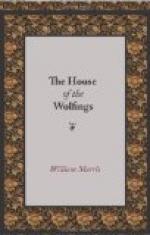Anyhow they came adown the river; on its waters on rafts, by its shores in wains or bestriding their horses or their kine, or afoot, till they had a mind to abide; and there as it fell they stayed their travel, and spread from each side of the river, and fought with the wood and its wild things, that they might make to themselves a dwelling-place on the face of the earth.
So they cut down the trees, and burned their stumps that the grass might grow sweet for their kine and sheep and horses; and they diked the river where need was all through the plain, and far up into the wild-wood to bridle the winter floods: and they made them boats to ferry them over, and to float down stream and track up-stream: they fished the river’s eddies also with net and with line; and drew drift from out of it of far-travelled wood and other matters; and the gravel of its shallows they washed for gold; and it became their friend, and they loved it, and gave it a name, and called it the Dusky, and the Glassy, and the Mirkwood-water; for the names of it changed with the generations of man.
There then in the clearing of the wood that for many years grew greater yearly they drave their beasts to pasture in the new-made meadows, where year by year the grass grew sweeter as the sun shone on it and the standing waters went from it; and now in the year whereof the tale telleth it was a fair and smiling plain, and no folk might have a better meadow.
But long before that had they learned the craft of tillage and taken heed to the acres and begun to grow wheat and rye thereon round about their roofs; the spade came into their hands, and they bethought them of the plough-share, and the tillage spread and grew, and there was no lack of bread.
In such wise that Folk had made an island amidst of the Mirkwood, and established a home there, and upheld it with manifold toil too long to tell of. And from the beginning this clearing in the wood they called the Mid-mark: for you shall know that men might journey up and down the Mirkwood-water, and half a day’s ride up or down they would come on another clearing or island in the woods, and these were the Upper-mark and the Nether-mark: and all these three were inhabited by men of one folk and one kindred, which was called the Mark-men, though of many branches was that stem of folk, who bore divers signs in battle and at the council whereby they might be known.
Now in the Mid-mark itself were many Houses of men; for by that word had they called for generations those who dwelt together under one token of kinship. The river ran from South to North, and both on the East side and on the West were there Houses of the Folk, and their habitations were shouldered up nigh unto the wood, so that ever betwixt them and the river was there a space of tillage and pasture.
Tells the tale of one such House, whose habitations were on the west side of the water, on a gentle slope of land, so that no flood higher than common might reach them. It was straight down to the river mostly that the land fell off, and on its downward-reaching slopes was the tillage, “the Acres,” as the men of that time always called tilled land; and beyond that was the meadow going fair and smooth, though with here and there a rising in it, down to the lips of the stony waste of the winter river.




